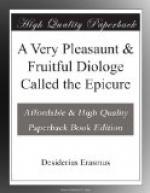in foule and beastly lustes. SP. I confesse
that. Hedo. But now tell me, whether you thynke
the sobre and wyse, which for playn vanities and shadowes
of plesure, booth dispice the true and godlye pleasures
of the mynde and chose for them selues suche thynges
as bee but vexacion & sorowe. SPV. I take it,
thei bee not. Hedo. In deede thei bee not druke
with wyne, but with loue with anger, with auarice,
with ambicion, and other foule and filthie desires,
whiche kynde of drunkenes is farre worse, the that
is gotten with drinking of wine. Yet Sirus
that leude cospanio ||of whom mention is made in ye
commedie, spake witty thynges after he had slepte
hym self soobre, and called too memorie his greate
and moost beastlye drunkenes: but the minde that
is infected with vicious & noughty desire, hath muche
a doo too call it selfe whom agein? How many
yeares doeth loue, anger, spite, sensualitie, excesse,
and ambition, trouble and prouoke the mynde?
How many doo wee see, whiche euen from their youth,
too their latter dais neuer awake nor repet them of
the drunkennes, of ambitio, nigardnes, wanton lust,
& riatte? Spu. I haue knowen ouermany of that
sorte. Hedo. You haue grauted that false and
fayned good || thinges, are not too bee estemed for
the pure and godly. Sp. And I affirme that
still. Hedo. Nor that there is no true and perfect
pleasure, except it bee taken of honest and godly thynges.
Spud. I confesse that. He. Then (I pray
you) bee not those good that the commune sorte seeke
for, they care not howe? Spu. I thinke they
be not. Hedo. Surely if thei were good, they
would not chaunce but onely too good men: and
would make all those vertuous that they happen vntoo.
What maner of pleasure make you that, doo you thinke
it too bee godly, which is not of true & honest thynges,
but of deceatfull: and coometh out of ye shadowes
of good thynges? Sp. || Nay in noo wyse. He.
For pleasure maketh vs to liue merely. Spu.
Yea, nothyng so muche. He. Therfore no man
truely liueth pleasauntly, but he that lyueth godly:
that is, whiche vseth and delecteth onli in good thynges:
for vertue of it selfe, maketh a man to habound in
all thynges that bee good, perfete, & prayse worthy:
yea, it onely prouoketh God the fountaine of all goodnes,
too loue and fauour man. SP. I almost consent
with you. HED. But now marke howe far they
bee from all pleasure, whiche seeme openly emongist
all men too folowe nothyng, but the inordinate delectation
in in thynges carnall. || First their mynde is vile,
and corrupted with the sauour and taste of noughtie
desires, in so muche that if any pleasaunt thing chaunce
them, forthwith it waxeth bitter, and is nought set
by, in like maner as where ye welle hed is corrupted
and stynketh, there ye water must nedes be vnsauery.
Agein ther is no honest pleasure, but that whiche
wee receaue with a sobre and a quiet mynde. For




